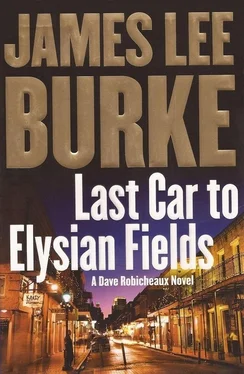“Jumpin’ Merchie Flannigan? From New Iberia?” I said.
“One and the same. How’d he get that name, anyway?” Father Jimmie said.
“Think of rooftops,” I said.
As I drove back to New Iberia, through Morgan City, and down East Main to my rented house on Bayou Teche, I tried not to think anymore of Father Jimmie and the black people in St. James Parish whose community had become a petro-chemical dumping ground. As sad as their story was, in the state of Louisiana it wasn’t exceptional. In fact, on television, the current governor had threatened to investigate the tax status of some young Tulane lawyers who had filed suit against several waste management companies on the basis of environmental racism. The old plantation oligarchy was gone. But its successors did business in the same fashion with baseball bats.
I fixed an early supper and ate it on an ancient green picnic table in the backyard. Across the bayou kids were playing tag football in City Park and smoke from meat fires hung in the trees. In the deepening shadows I thought I could hear voices inside my head: my adopted daughter, Alafair, away at Reed College; my deceased wife Bootsie; and a black man named Batist, to whom I had sold my bait and boat rental business south of town. I didn’t do well on Saturday afternoons. In fact, I wasn’t doing well on any afternoon.
On some weekends I drove out to the dock and bait shop to see him. We’d fish the swamp for bass and sac-a-lait, then head home at sunset, the cypress trees riffling like green lace in the wind, the water back in the coves bloodred in the sun’s afterglow. But across the road and up the incline from the dock were the burned remains of the house my father had built out of notched and pegged timbers during the Depression, the home where I had lived with my wife and daughter, and I had a hard time looking at it without feeling an indescribable sense of loss and anger.
The inspector from the fire department called it “electrical failure.”
I wished I could accept the loss in terms as clinical as those. But the truth was I had trusted the electrical rewiring on my home to a fellow AA. member, one who had stopped attending meetings. He filled the walls with cheap switches that he did not screw-wrap and inserted fourteen-gauge wire into twelve-gauge receptacles. The fire started inside the bedroom wall and burned the house to the ground in less than an hour.
I went into the house and looked up Merchie Flannigan’s name in the directory. I had known his parents in both New Orleans and New Iberia, but I’d never had reason to take official notice of Merchie until I was a patrolman near the Iberville Welfare Project off Basin Street, back in the days when cops still rang their batons off street curbs to signal one another and white kids would take your head off with water-filled garbage cans dropped from a five-story rooftop.
Long before Hispanic and black caricatures acted out self-created roles as gangsters on MTV, white street gangs in New Orleans fought with chains, steel pipes, and zip guns over urban territory that a self-respecting Bedouin wouldn’t live in. During the 1950s, the territorial war was between the Cats and the Frats. Frats lived uptown, in the Garden District and along St. Charles Avenue. Cats lived in the Irish Channel, or downtown or in the projects or out by the Industrial Canal. Cats were usually Irish or Italian or a mixture of both, parochial school bust-outs who rolled drunks and homosexuals and group-stomped their adversaries, giving no quarter and asking for none in return.
In a back-alley, chain-swinging rumble, their ferocity and raw physical courage could probably be compared only to that of their historical cousins in Southie, the Five Points, and Hell’s Kitchen. Along Bourbon Street, after twelve on Saturday nights, the Dixieland bands would pack up their instruments and be replaced by rock ‘n’ roll groups that played until sunrise. The kids spilling out the front doors of Sharkey Bonnano’s Dream Room, drinking paper cup beer and smoking cigarettes on the sidewalks, their motorcycle caps and leather jackets rippling with neon, made most tourists wet their pants.
But Jumpin’ Merchie Flannigan could not be easily categorized as a blue-collar street kid who had made good in the larger world. In fact, I always had suspicions that Jumpin’ Merchie joined a gang for reasons very different from his friends in the Iberville. Unlike most of them, he was not only streetwise but good in school and naturally intelligent. Merchie’s problem really wasn’t Merchie. It was his parents.
In New Iberia Merchie’s father was thought of as a decent but weak and ineffectual man whose rundown religious store was almost an extension of its owner’s personality. Many nights a sympathetic police officer would take Mr. Flannigan out the back door of the Frederic Hotel bar and drive him to his house by the railroad tracks. Merchie’s mother tried to compensate for the father’s failure by constantly treating Merchie as a vulnerable child, protecting him, making him wear short pants at school until he was in the fifth grade, denying him entry into a world that to her was as unloving as her marriage. But I always felt her protectiveness was of a selfish kind, and in reality she was not only sentimental rather than loving, she could also be terribly cruel.
After the family moved to New Orleans and took up life in the Iberville, Merchie became known as a mama’s boy who was anybody’s punching bag or hard-up pump. But at age fifteen, he threw a black kid from the Gird Town Deuces off a fire escape onto the cab of a passing produce truck, then outraced a half dozen cops across a series of rooftops, finally leaping out into space, plummeting two stories through the ceiling of a massage parlor.
His newly acquired nickname cost him a broken leg and a one-bit in the Louisiana reformatory, but Jumpin’ Merchie Flannigan came back to Canal Street and the Iberville Project with magic painted on him.
When I called him at home he was gregarious and ingratiating, and said he wanted to see me. In fact, he said it with such sincerity that I believed him.
His home, of which he was very proud, was a gray architectural monstrosity designed to look like a medieval castle, inside acres of pecan and live oak trees, all of it in an unzoned area that mixed pipe yards and welding shops with thoroughbred horse barns and red-clay tennis courts.
He greeted me in the front yard, athletic, trim, wearing pleated tan slacks, half-top, slip-on boots, and a polo shirt, his long hair so blond it was almost white, a V-shaped receded area at the part the only sign of age I could see in him. The yard was covered in shadow now, the chrysanthemums denting in the wind, the sky veined with electricity. In the midst of it all Merchie seemed to glow not so much with health and prosperity as confidence that God was truly in His heaven and there was justice in the world for a kid from the Iberville.
He meshed his fingers, as though making a tent, then pointed the tips at me.
“You were out at the Crudup farm in St. James Parish today,” he said.
“Who told you?” I asked.
“I’m trying to clean up the place,” he replied.
“Think it might take a hydrogen bomb?”
“So give me the gen on it,” he said.
“The Crudup woman says she was cheated out of the title.”
“Look, Dave, I bought the property three years ago at a bankruptcy sale. I’ll check into it. How about some trust here?”
It was hard to stay mad at Merchie. I knew people in the oil business who were openly ecstatic at the prospect of Mideastern wars or subzero winters in the northern United States, but Merchie had never been one of them.
“Been out of town?” I said.
“Yeah, Afghanistan. You believe it?”
Читать дальше












